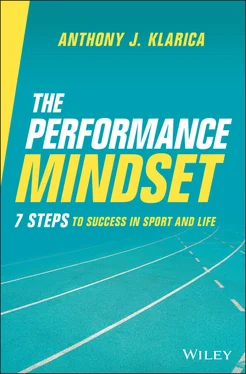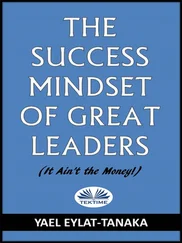Anthony J. Klarica - The Performance Mindset
Здесь есть возможность читать онлайн «Anthony J. Klarica - The Performance Mindset» — ознакомительный отрывок электронной книги совершенно бесплатно, а после прочтения отрывка купить полную версию. В некоторых случаях можно слушать аудио, скачать через торрент в формате fb2 и присутствует краткое содержание. Жанр: unrecognised, на английском языке. Описание произведения, (предисловие) а так же отзывы посетителей доступны на портале библиотеки ЛибКат.
- Название:The Performance Mindset
- Автор:
- Жанр:
- Год:неизвестен
- ISBN:нет данных
- Рейтинг книги:3 / 5. Голосов: 1
-
Избранное:Добавить в избранное
- Отзывы:
-
Ваша оценка:
- 60
- 1
- 2
- 3
- 4
- 5
The Performance Mindset: краткое содержание, описание и аннотация
Предлагаем к чтению аннотацию, описание, краткое содержание или предисловие (зависит от того, что написал сам автор книги «The Performance Mindset»). Если вы не нашли необходимую информацию о книге — напишите в комментариях, мы постараемся отыскать её.
The Performance Mindset: 7 steps to success in sport and life
The Performance Mindset: 7 steps to success in sport and life
The Performance Mindset — читать онлайн ознакомительный отрывок
Ниже представлен текст книги, разбитый по страницам. Система сохранения места последней прочитанной страницы, позволяет с удобством читать онлайн бесплатно книгу «The Performance Mindset», без необходимости каждый раз заново искать на чём Вы остановились. Поставьте закладку, и сможете в любой момент перейти на страницу, на которой закончили чтение.
Интервал:
Закладка:
adaptability
squad spirit
being a self‐aware learner. 7
Enjoyment matters
Consider what keeps a person highly engaged long enough to maximise the foundation of physical conditioning and skill they have laid in their sport. You cannot become an athlete without dedicated hours of purposeful training and time‐on‐task. If an athlete over time is not enjoying what they are doing, it is unlikely they will train often and hard enough, or with enough engagement and intent, to realise their talent. This applies to all ages but is particularly relevant for younger athletes during their development or transition years from junior to open sport. There are many competing interests for young people so enjoying what they do from an early age is paramount. It is also relevant to more mature athletes, because the level of competition in most arenas is competitive enough that once practice, attitude or mindset slides, performance will give, regardless of talent, even for experienced performers.
In Search of Greatness , an insightful sports documentary by Gabe Polsky released in 2018, features a host of sporting legends including basketballer Michael Jordan, Brazilian soccer star Pelé, Canadian NHL ice‐hockey star Wayne Gretzky, tennis player Serena Williams and San Francisco 49ers NFL player Jerry Rice, often cited as the best wide receiver there ever was. Interviews with each of the athletes provide telling insights into their development and performance. 8
Rice insists he didn't feel he had any genetic advantage and was not the most talented receiver, size‐ or speed‐wise, but ‘I knew I had football speed’. His mother wasn't a fan of the game, thinking it too rough. Acknowledging his challenges, however, he explained that ‘what enabled [my] performance was that I worked on certain qualities that I was lacking to make up for my deficiencies’.
Gretsky also recognised early that ‘speed and power was not going to get me to the next level. My wisdom and vision on the ice [got me to the next level]’. Such was his enjoyment of the game of ice‐hockey that from an early age, as he watched games, he would trace the line of the puck on a sketch he had made of the ice‐rink. He also practised regularly on his own. ‘No‐one told me to do it,’ he added.
For both Rice and Gretsky, enjoyment of their sport was integral to their development. This enjoyment drove them to practise alone or play active unstructured games with friends, related or unrelated to their sport. It also developed creativity in how they saw the game and contributed to feeding a strong intrinsic passion to improve.
I have found this passion in many athletes I have worked with over the years. The reasons for their enjoyment varies, from being outdoors to expressing themselves physically, being in a team environment, trying to master a skill or trying to achieve something. A key, consistent factor is that enjoyment is in some way related to their chosen sport, which drives their engagement and time‐on‐task. For this reason, I ask athletes I work with to identify and list what they enjoy and to regularly revisit and update their notes.
How much practice?
Over the past decade much has been written about the ‘10 000 hours rule’, which posits that 10 000 hours of practice is required to become expert in any field, such as sport, music, medical practice or teaching. The notion that 10 000 hours of practice will guarantee expertise was popularised by Malcolm Gladwell in his 2011 book Outliers . 9Although this ‘rule’ is often cited, it is an oversimplification that has been taken far too literally. Early discussion on 10 000 hours of practice was generated by Anders Ericsson and colleagues when reviewing contributing factors to musical expertise. 10They found that by the age of 20 ‘expert’ pianists had accumulated approximately 10 000 hours of practice, compared with a total of about 2000 hours for amateur pianists.
In Ericsson's 2016 book Peak: secrets from the new science of expertise (co‐authored by Robert Pool), he observes that ‘unfortunately, the 10 000 rule — which is the only thing that many people today know about the effects of practice — is wrong in several ways’. 11Among the reasons he identifies are that the amount of practice to become expert ‘varies from field to field’ and that ‘not every type of practice leads to improved ability’. He also says that ‘anyone can improve, but it requires the right approach’.
In sport, the reality is that 10 000 hours of dedicated, deliberate practice is unlikely to be accumulated by late teenage years or age 20. Research also confirms that in many sports athletes achieve national representation or professional contracts with less than 10 000 hours of dedicated practice. Even for those with high volumes of practice, it is not the differentiating factor. Mindset will contribute to practice and make best use of the time invested.
Transferring accumulated hours of training into competition environments is something I have seen many athletes struggle with. Large volumes of training can also lead to mental fatigue and burnout, creating additional pressure that negatively impacts both people and performance. One of the more common referrals to performance psychology practices is to help athletes replicate training levels in competition. Mindset is the bridge linking training and performance.
Research insights
A meta‐analysis of a large number of studies concluded that deliberate practice accounted for about 18 per cent of sport performance overall. In elite‐level performers, deliberate practice accounted for only 1 per cent of variance in performance. Performers who reached a high level of skill did not tend to start their sport earlier than lower skill athletes.
In addition to deliberate practice, the study noted that other experiences may contribute to individual differences in performance. These include competition experience, play activities and possible participation in multiple sports during certain stages of development. Later specialisation may also reduce the incidence of injuries and psychological burnout. Specific psychological variables that could account for performance differences beyond deliberate practice include attention control, confidence, propensity to experience performance anxiety and aversion to negative outcomes. 12
Many different paths
It is evident, then, that there are many different paths to becoming an elite athlete. An important 2016 paper suggested that in contrast to Ericsson's deliberate practice framework, in which linear sporting progression through time spent in practice is inferred, successful athletes follow complex, non‐linear, individualised routes to the top of their sport. 13They must adapt to anticipated and unanticipated developmental opportunities, setbacks and a range of transitions as they progress. The authors also noted that athletes who achieve a high level are differentiated by positive, proactive coping and a learning approach to challenges.
As alluded to, I have witnessed many individual paths to competitive arenas. I've worked with athletes who were early starters and progressed through the ranks, those who have had interruptions and late starters. What has enabled them to achieve their sporting goals has been a commitment driven by passion, outstanding support and an investment in mindset to deal with and learn from the challenges experienced on their journey. These are some of the factors that have enabled continued progression towards goals.
Matthew Syed, in his book Bounce: the myth of talent and the power of practice , emphasises how the power of practice, environment and mindset helped him become a British table tennis champion and Olympian. 14He recounts that a combination of circumstances contributed to his laying a foundation of many hours of playing table tennis, but that mindset was a key ingredient to his progression. He also admits that he had powerful advantages not available to hundreds of thousands of other youngsters. ‘What is certain,’ he writes, ‘is that if a big enough group of youngsters had been given a table at eight years of age, had a brilliant older brother to practice with, had been trained by one of the best coaches in the country (who coached nearby), had joined the only 24 hours club in the country, and practiced for thousands of hours by their early teens, I would not have been number one in England.’
Читать дальшеИнтервал:
Закладка:
Похожие книги на «The Performance Mindset»
Представляем Вашему вниманию похожие книги на «The Performance Mindset» списком для выбора. Мы отобрали схожую по названию и смыслу литературу в надежде предоставить читателям больше вариантов отыскать новые, интересные, ещё непрочитанные произведения.
Обсуждение, отзывы о книге «The Performance Mindset» и просто собственные мнения читателей. Оставьте ваши комментарии, напишите, что Вы думаете о произведении, его смысле или главных героях. Укажите что конкретно понравилось, а что нет, и почему Вы так считаете.










